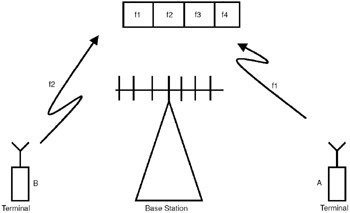8.1 FREQUENCY DIVISION MULTIPLE ACCESS
|
| < Day Day Up > |
|
8.1 FREQUENCY DIVISION MULTIPLE ACCESS
In radio communication systems, a certain frequency band is allocated for a specific use. This band is divided into smaller bands, and this pool of bands is available for all the terminals to share. Depending on the need, the base station allocates a frequency (the center frequency of a band) for the terminal to transmit. This is known as frequency division multiple access (FDMA). In FDMA systems, there is a central station that allocates the band (or frequency) to different terminals, based on their needs.
Consider the example of a mobile communication system. The system consists of a number of base stations. As shown in Figure 8.1, a base station has a pool of frequencies (here, f1 to f4). All four frequencies are available for sharing by the mobile terminals located around the base station. The frequency will be allocated based on need. Mobile terminal A will be allocated the frequency f1, and then mobile terminal B will be allocated frequency f2.

Figure 8.1: Frequency division multiple access.
In FDMA, the frequency band is divided into smaller bands, and the pool of these bands is available for a number of radio terminals to share, based on the need. A central station allocates the bands to different terminals based on the request.
To ensure that there is no overlap in transmission by different terminals using adjacent frequencies, a guard band is provided. A small separation between adjacent bands is called the guard band.
| Note | FDMA is used in many radio systems. Mobile communication systems and satellite communication systems use this access technique. |
|
| < Day Day Up > |
|
EAN: 2147483647
Pages: 313